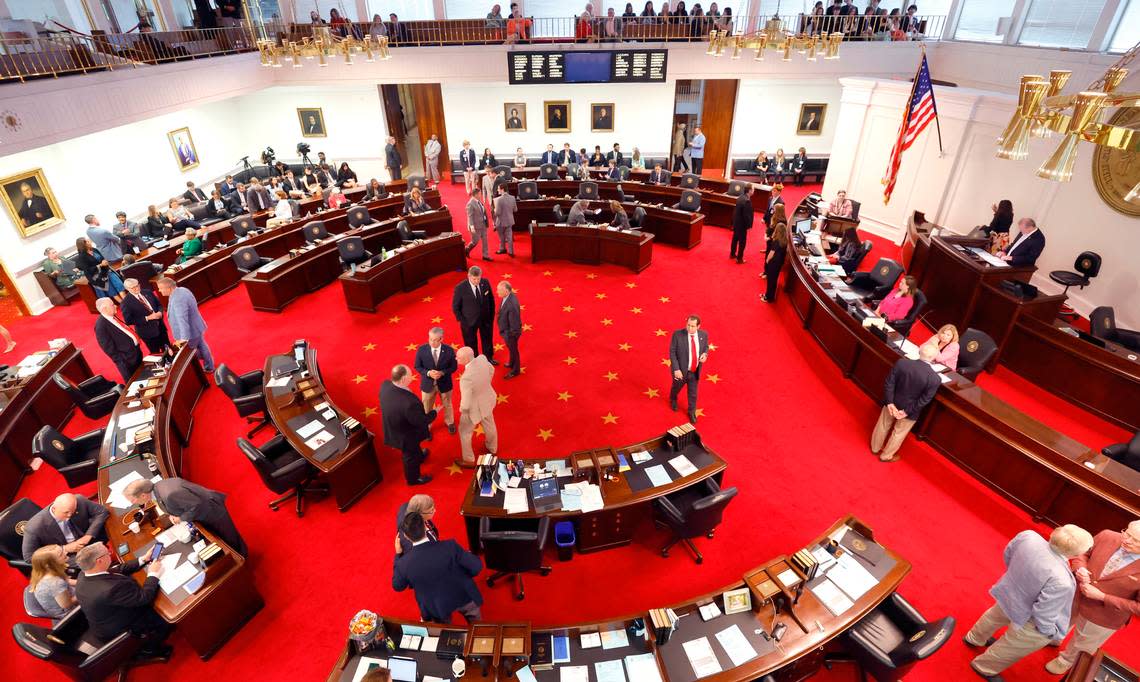Dozens of new laws in North Carolina start Dec. 1. Here’s what they do
Dozens of new laws in North Carolina take effect Friday that will impact people’s daily lives, ranging from what you can talk about in the workplace to where you can carry guns, and from rioting penalties to election law.
Here’s a rundown of the new laws and what they mean for you:
Rioting penalties
House Bill 40: “Prevent Rioting and Civil Disorder.” Cooper let this bill become law without his signature in March. It is effective for any crimes committed on or after Dec. 1, 2023.
The law increases penalties for rioting, or inciting rioting, that causes serious injury and property damage, including if a person causes more than $2,500 in damage during a riot or serious bodily injury, or if the person causes a death while rioting.
The new law was modified in Senate Bill 626, “Modify Human Trafficking and Rioting Laws,” which also adds “patronizes, solicits” to the list of what describes a human trafficking crime.
This anti-rioting bill was a different version of one pushed by Republican House Speaker Tim Moore in the wake of the 2020 George Floyd protests, when people damaged property in downtown Raleigh and other city centers as some protests turned violent.

Talking about race at work
Senate Bill 364: “Nondiscrimination & Dignity in State Work.” This new law regulates how state employees can discuss topics like race and gender at work, including in hiring interviews. The law bans state government workplaces from “promoting” certain concepts, or using them in training, including that:
▪ someone is inherently racist, sexist or oppressive because of their race or sex
▪ someone bears responsibility for past actions by those of the same race or sex
▪ “any individual, solely by virtue of his or her race or sex, should feel discomfort, guilt, anguish, or any other form of psychological distress.”
Much of the language is similar to a previous bill that did not become law, which would have banned the same discussions in public schools.
Republican lawmakers overturned Cooper’s veto. When Cooper vetoed the bill, he cited racist comments made by a lawmaker on the House floor. Cooper said that the legislature shouldn’t be “pretending that bias and racism don’t exist,” and said the legislation “attempts to eliminate training that can help us understand the unconscious bias we all bring to our work and our communities.”
Gun law
Senate Bill 41: “Guarantee 2nd Amendment Freedom and Protections.” The bill was the first successful veto override this year, and ended a requirement to get a permit to buy a handgun. Another part of this bill loosening gun regulations goes into effect on Dec. 1. The newly effective law allows concealed carry permit holders to carry guns at places of worship that also have schools.
Republican Sen. Danny Britt of Lumberton, one of the bill’s primary sponsors, said during debate that it would make it easier for church-goers and other worshipers to protect themselves, The N&O previously reported.
Abortion law
Senate Bill 20: “Care for Women, Children, and Families Act.” Most of SB 20, which restricts abortions after 12 weeks gestation with exceptions, went into effect on July 1 after Republican lawmakers overturned Cooper’s veto. But other parts of the law go into effect Dec. 1, including a provision dealing with safe surrender of infants. A parent who follows the new law won’t be prosecuted for abandoning an infant if the baby is fewer than 30 days old. The previous law was 7 days.

Election law
Two sections of Senate Bill 747: “Elections Law Changes,” which was vetoed by Cooper and overridden by the legislature, take effect for new offenses. The parts of the law starting Dec. 1 make it a misdemeanor for someone to impersonate a “chief judge, judge of election, or other precinct official while in the discharge of duties in the registration of voters or in conducting any primary or election.”
It also adds the same charge for “any person other than the State Board or a county board of elections, or any employee of the State Board or a county board of elections, to affix or print any identifier for the purpose of tracking the form on any absentee ballot request form.”
Fake pills
Senate Bill 206: “Control Substances/Opioid/Vaccine/At Home Omnibus.” Signed into law by Cooper in May, the part of the new law effective Dec. 1 makes it illegal to possess, make or distribute equipment that is used to make counterfeit pills. There are exceptions for pharmacists.
Probation supervision
House Bill 87: “Probation Modifications/Sheriff Authority.” Part of the law now effective will delegate some limited authority to probation officers to reduce the amount of time an offender is under supervised probation.
Moore County grid attack
Senate Bill 58: “Protect Critical Infrastructure.” This new law, the entirety of which went into effect Dec. 1, was passed after the attack on the Moore County electric substations that remains unsolved a year later. The law increases the punishment for property crimes against utilities. It passed unanimously and was signed by Cooper in June. It applies to crimes committed on or after Dec. 1.

Health care treatment of minors
Sections of Senate Bill 49, “Parents Bill of Rights,” are law as of Dec. 1. Republican lawmakers overturned Cooper’s veto of the bill that regulates how LGBTQ+ topics can be discussed in schools, including a student’s use of a different name or pronoun. The section that became law Dec. 1 is about something else: parental consent for medical treatment of minors. Health care practitioners need documented parental consent, or face a fine of up to $5,000.
Other new state laws
▪ Sections of Senate Bill 582: “North Carolina Farm Act of 2023.”
▪ House Bill 34: “Protect Those Who Serve and Protect Act.”
▪ Senate Bill 135: “Registered Veterinary Technician Modification.”
▪ Senate Bill 246: “Property Owners Protection Act.”
▪ Sections of Senate Bill 91: “Amend Rule 4/Acceptance of Service.”
▪ Sections of House Bill 193: “AOC Court Changes/Amend Expunction.”
▪ Sections of House Bill 186: “Juvenile Justice Modifications/DOI Expenses/Technical Changes.”
▪ Sections of House Bill 447: “Clarify Motor Vehicle Dealer Laws.”
▪ Sections of Senate Bill 492: “Adult Correction/Law Enforcement Changes.”
▪ Sections of Senate Bill 189: “Fentanyl Drug Offenses and Related Changes,” which increases the penalties for heroin and fentanyl drug trafficking.
▪ Senate Bill 579: “Prevent Harm to Children,” which increases the punishment for disseminating obscenity.
▪ Sections of House Bill 142: “Protect Our Students Act,” which increases penalties for not reporting misconduct toward children.
▪ Sections of House Bill 125: “NC Health & Human Services Workforce Act.”
▪ An insurance law change in Senate Bill 452: “DOI & Insurance Law Amendments/Revise HS Athletics.”
▪ Parts of House Bill 600: “Regulatory Reform Act of 2023.”
▪ Parts of Senate Bill 409: “Various Changes to Criminal and Civil Laws.”
